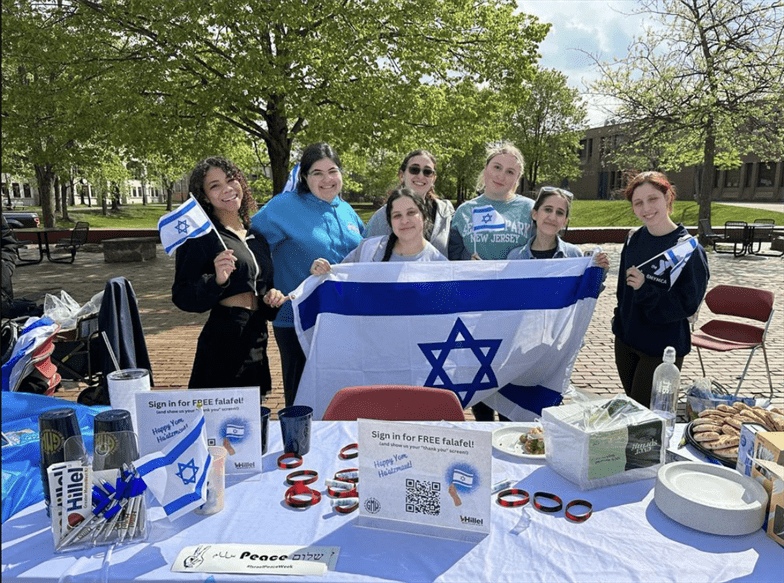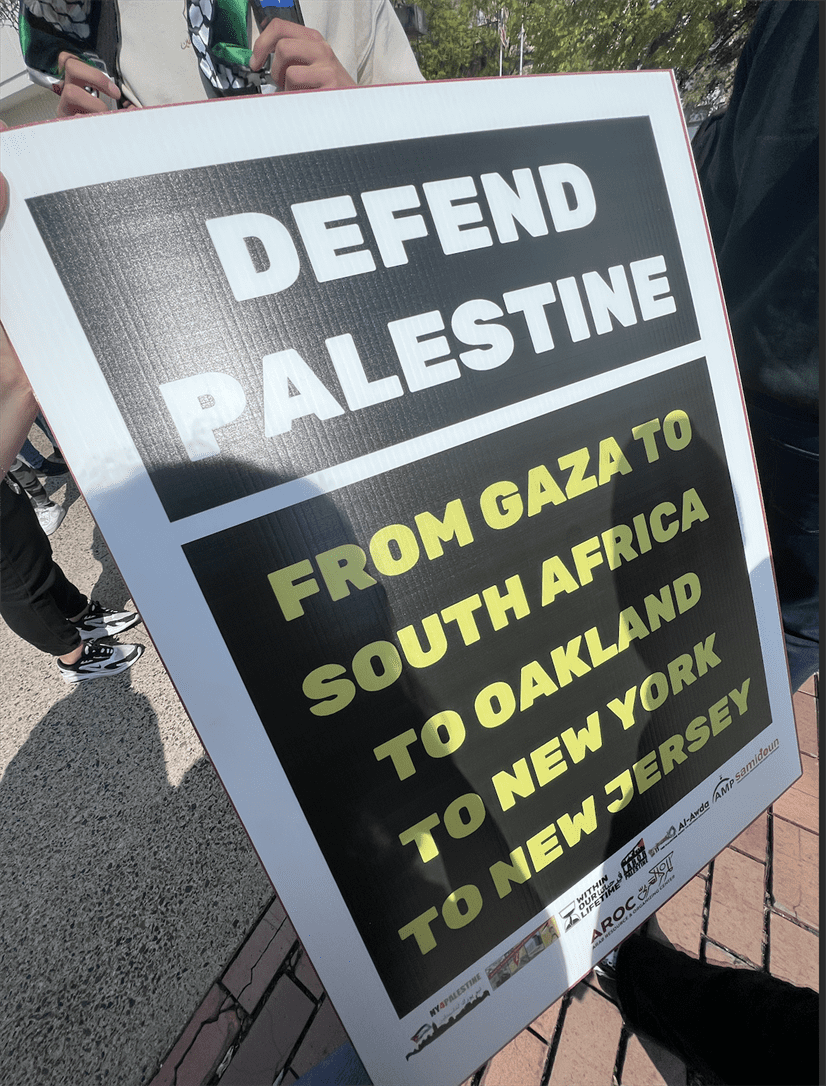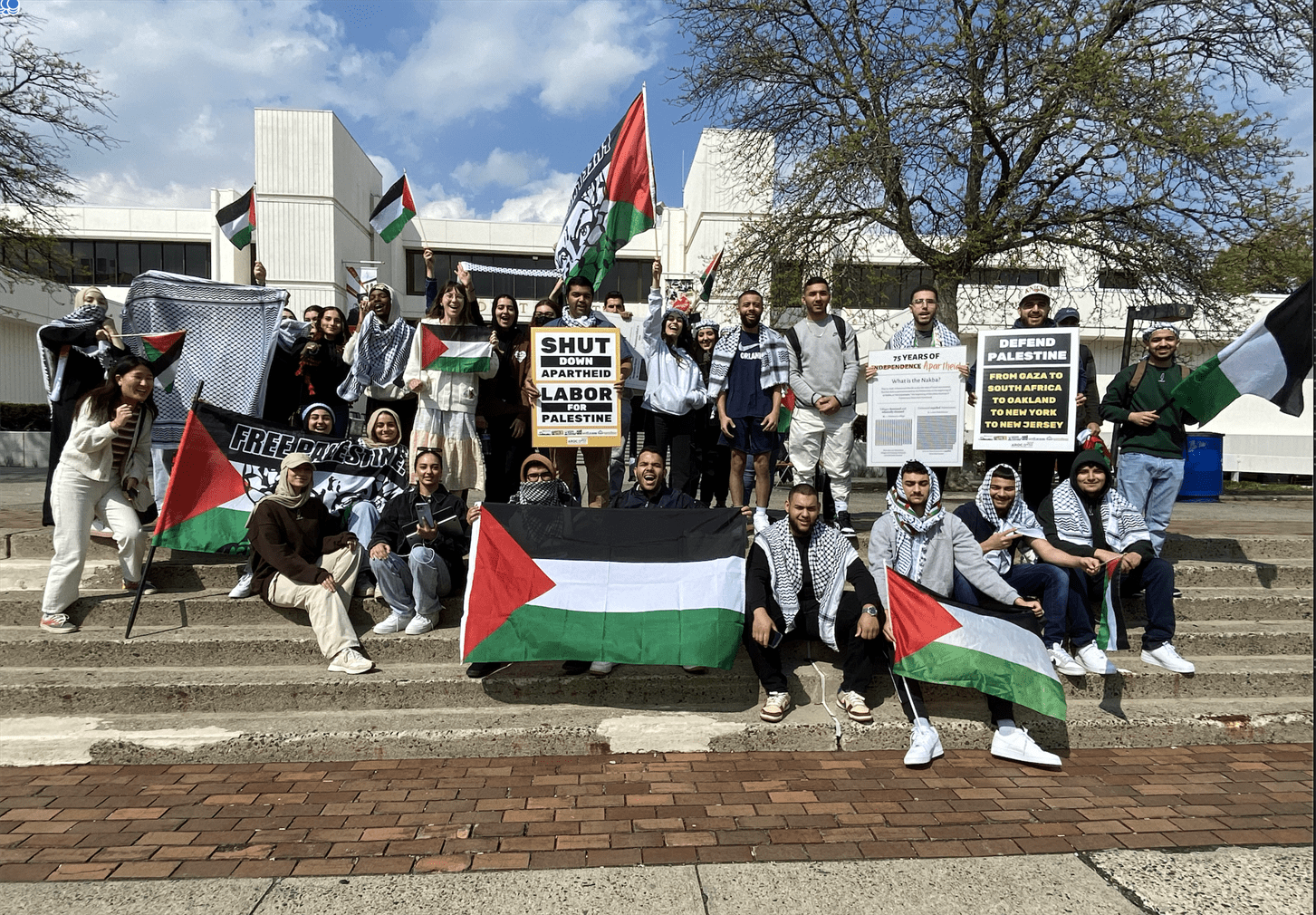On Wednesday, April 26, the Montclair State University sector of the Jewish Hillel Organization was met with opposition as they set up a table commemorating Jewish culture and Israel’s Independence Day, celebrated every April 26 since their declaration 75 years ago.
The table itself, handing out free Falafel and other cultural foods, claims that they had not set up for any political reason. Rebekah Adelson, director of Hillel of Greater MetroWest, was present at the table clarifying their reasons for being there.
“We’re just celebrating Israel as a people and a culture,” Adelson said. “We don’t deal with politics at Hillel. So this isn’t anything political. This is simply an event, celebrating culture. And unfortunately, we have protesters here and it’s pretty common across the country that people come out and protest this event.”

Montclair State's Hillel table gather supporters for a group photo
Photo courtesy of Montclair Hillel
Despite their intentions, Palestinian students here at Montclair State saw it as an opportunity to make a statement. Senior biology major Serene Salem stated her reasonings for being there and protesting.
“We wanted to just come out to show and advocate for our country, Palestine, and we just posted it, called up all our friends and brought up a lot of people and just came out just to do a silent protest,” Salem said.
This protest in particular was not a formally organized protest, nor was it affiliated with any organizations on campus.
“This was very last minute,” Salem said. “So, it’s not affiliated with any organization and we really didn’t know the rules and the guidelines. I don’t know who exactly came and spoke to us, but they did come and speak to us and tell us the rules and they told us it’s ok that this time it was unorganized. But other than that, next time we should try to [organize], which hopefully we’ll be doing that.”

One of the signs held by Palestinian protesters
Sophia Lazaridis | The Montclarion
The areas between both sides were divided by the steps of the Student Center with officers monitoring the situation in case of any hostility. A statement from a student, who has chosen to remain anonymous, said the protest was mainly peaceful and never got too wild.
“Frankly, there was minimal interaction between both sides because of fear for any type of over-incitement and altercation, which is obviously something that happens a lot in these types of things,” the student said. “There were a couple of moments where there’s some nuance between conversations between some different people. I think overall, it was nothing too crazy.”
Salem backs this statement.
“It’s a very peaceful protest,” Salem said. “We’re not trying to instigate anything. If anyone wants to come and learn, they’re more than welcome. We’re not trying to instigate anything and have problems with anyone.”
Elmar Murtada, a junior justice studies major with an international justice concentration, was worried about the protest.
“I was very worried that it would not turn out well,” Murtada said. “I expected some altercations, some violence. It exceeded my expectations as in how well it turned out. It turned out extremely well, both sides were very respectful.”
However, the minimal interactions between the two sides were short-lived as debates between students arose. The topic, being as sensitive as it is, brought the passion out of the debaters, but students claim that it was just a healthy debate.
Noga Danai, a freshman acting major, who was there helping run the Hillel table, chose not to respond to protestors.
“We came and we set up, the other side was here. It happens. I don’t respond,” Danai said. “I’ve seen it throughout my whole life as a person from Israel, I’ve experienced this multiple times. There’s always two sides. You can’t say that there isn’t, but it’s uncomfortable, but they also have a right to protest.”
Because of her experiences in the past, Danai continued to emphasize how “uncomfortable” she was with the protesters.
“It just makes you feel uncomfortable for who you are very much, especially being Israeli and not finding Israeli people on campus at all,” Danai said. “This makes you want to hide it even more a bit and not want to share who you are and where you’re from.”
Overall, the protesters want to make sure that everyone understood that this was a statement of peace.
“Supporting Palestine does not mean we are anti-Semitic, it does not mean that we oppose Israel existing at all,” Murtada said.



